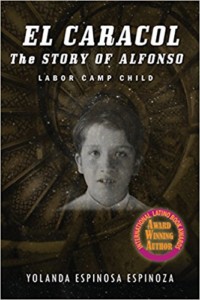Title: El Caracol: the Story of Alfonso – Labor Camp Child
Author: Yolanda Espinosa Espinoza
Publisher: Toplink Publishing, LLC
ISBN: 978-1948262514
Pages: 117
Genre: Biography
Reviewed by: Candace L. Barr
Pacific Book Review Star
Awarded to Books of Excellent Merit

El Caracol: the Story of Alfonso – Labor Camp Child is mostly written in the voice of Alfonso himself as remembered by his daughter Yolanda Espinoza. Born in California to Mexican-born parents, Alfonso “Al” Espinosa, was destined from birth to make an arduous journey through life on a winding path reminiscent of a conch shell or a grapevine; both possible English translations of the Spanish word “caracol.” Growing up poor and Mexican in America meant facing racism from peers and authority figures, being taught to be ashamed of his heritage and sacrificing happiness for the sake of his family. Through all this and a bout with a disease that had killed many before him, Alfonso was tenacious, as Yolanda’s retelling casts him as an awe-inspiring figure.
The main narrative starts before Alfonso was born, detailing his father’s coming of age during the Mexican Revolution and his mother’s upbringing which led to her being sent to the United States to care for her sisters’ families. Espinoza’s retelling of these stories makes it clear that storytelling is in her blood; her grandfather told tales from his life and the Arabian Nights to his children as they sat under the stars, so it is only natural that her father’s story be told in such lush detail. The story continues through Alfonso’s experiences moving from home to home and school to school as his father followed the trail of employment in the fields. It is at school where Alfonso first learned about what it means to be different. There, he faced bullying from students and teachers alike. However, he did have a few teachers who encouraged him and helped him foster his talents. They are among the bright spots in a story that Alfonso refuses to allow to wallow in darkness.
Perhaps the most defining part of the book is Alfonso’s tuberculosis diagnosis and treatment, which is first addressed in the prologue then described in more detail at the end of the main narrative. His struggle against the illness attacking his body and the oppressive atmosphere of the sanitarium reinforce his determination and the power of language. That a poor Mexican boy who once lived in a boxcar could affect such change and came to embrace parts of him that others tried to stifle is nothing short of inspiring. While Espinoza’s original intended audience was her students, who grew up in similar circumstances to Alfonso’s, the story resonates beyond the migrant community. Yolanda Espinosa Espinoza’s memoir was a beautiful visual of perseverance under incredible odds and circumstances.



Follow Us